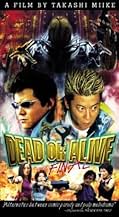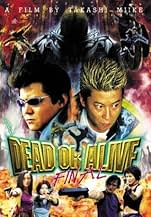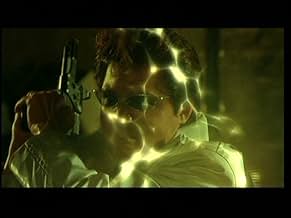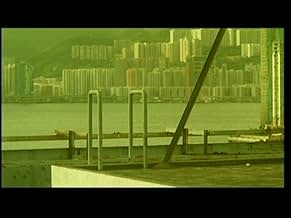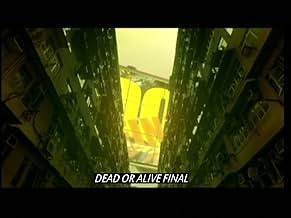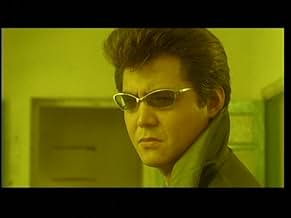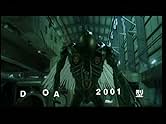CALIFICACIÓN DE IMDb
5.6/10
2.9 k
TU CALIFICACIÓN
Agrega una trama en tu idiomaThe ace cop of a totalitarian police force and a drifting android play their parts in a post-apocalyptic society. They are destined to fight. Their encounter will change them forever.The ace cop of a totalitarian police force and a drifting android play their parts in a post-apocalyptic society. They are destined to fight. Their encounter will change them forever.The ace cop of a totalitarian police force and a drifting android play their parts in a post-apocalyptic society. They are destined to fight. Their encounter will change them forever.
- Dirección
- Guionistas
- Elenco
William Wai-Lun Duen
- Gangster
- (as William Duan)
Wai-Kwong Lo
- Gangster
- (as Kenneth Low)
Don Thai Theerathada
- Don
- (as Donald Panutat)
- Dirección
- Guionistas
- Todo el elenco y el equipo
- Producción, taquilla y más en IMDbPro
Opiniones destacadas
In the last of a trilogy, Riki Takeuchi and Sho Aikawa are once again on the opposite ends of the spectrum, as they were in the first DOA, after being the best of friends in the second one. Riki is a cop searching for his son being held by a gang whom drifter Sho is a part of. Even though, if you think about it and put yourself in Miike's flow of logic, this ending film is inevitable in it's actions, it's still the less of the three. Of course no Takashi Miike film is totally without merit and such is the case here. There are a few setpeices that make it worthwhile, but the poetry I usually find in a Miike film is not found here (at least in the amounts that I usually expect from this director)
My Grade: C-
My Grade: C-
While Miike Takashi has not written any of the films he has directed, his style and formula (or lack thereof) has made him a force to be reckoned with in modern filmmaking. He takes the most mundane of stories and scenarios and gives it a fresh jolt of adrenaline and emotion, making his films seem as fresh and as original as anything by David Lynch or Stanley Kubrick. "Dead or Alive: Hanzaisha" was about a cop and a criminal struggling against each other and ultimately destroying both their families and themselves. "Dead or Alive 2: Tôbôsha" was about two hitmen rediscovering their innocence only to lose it again and ultimately destroy themselves. Now we have "Dead or Alive: Final," the third and final installment in a trilogy of films that are unrelated to each other...and yet they've all got something in common besides the director and the two main actors.
"Dead or Alive: Final" plunges us into Yokohama of 2346, where a homosexual mayor has outlawed human breeding and keep srigid control through use of birth control pills and his chief enforcer, Officer Honda (Takeuchi Riki). Standing in the mayor's way is a group of rebels, led by Fong (Terence Yin) and Jun (Josie Ho), who now have a new ally, a "replicant" by the name of Ryo (Aikawa Sho, still sporting his cool blond hair). Immediately, the "Blade Runner" references run rampant, right down to the terminology. The use of the word "replicant" to describe Ryo, the omnipresent floating blimp with the huge TV screens flashing advertisements, the decrepit rain-swept environment of a ravaged city, even the characters themselves, all homages to "Blade Runner." Oh but there are other sci-fi nods too. Elements of "THX-1138," "The Matrix," "The Terminator," etc...it's all there, making "Dead or Alive: Final" almost a satire (and sometimes a parody) of sci-fi cinema.
There's more than just the humorous nod to sci-fi going on. Yet again, Miike has given us a few thrills via his "Don't expect anything" style. While there is nothing truly shocking in this film compared to its predecessors (save for the ending), there is still the nod to Kitano's films (i.e. beautiful scenery, long shots of characters, and even a few beach scenes). But while Kitano is poetic, Miike is like a jackhammer, hitting you full-on in the face with his own brand of filmmaking. The story is nothing new, and even the characters are easily understood and familiar, but there is something about Miike's gritty take on the conventions of genres and cinema that gives it an originality. Who else but Miike could make three completely different and unrelated films and tie them all together into a package that is both confusing and cohesive? Okay, so the ending still threw me for a loop, but it was typical of Miike.
In the end, we are left with many of the same themes...the predominant one being that some people just never quit, and in the end it will destroy them. Honda's son is kidnapped, and even after he is returned, he is still hellbent on stopping the rebels. Ryo could easily back out of the fight and go on with his life, but he can't. The evil dictator could easily allow people to live their lives as they see fit, but he refuses to relent. Even a scene where a rebel is given the choice to either die or take the birth control drug, he decides to die for a cause that is pretty much lost. In all three "Dead or Alive" movies, nobody quits...and as a result everybody dies. The people who do know when to back down are the ones who survive. Ryo and Honda can't quit...and in the end, they meet for their final showdown, which resonates their endings in the previous two films. The tie in is not as neat as it could have been, but again, it's typical of Miike to give us something we really would not have expected, and at the same time that it's shocking, it makes a strange kind of sense. "Dead or Alive: Final" ties in all three movies, but not in the way that you might think. It yet again presents the same themes but from a completely different angle. It's like telling the same story...but not the same story. The idea is the same, but the details are different. There is the essence of the "Dead or Alive" films, and is probably the essence of Miike's films. They're nothing new...and yet, they are. It's not for everybody, but it's certainly different.
"Dead or Alive: Final" plunges us into Yokohama of 2346, where a homosexual mayor has outlawed human breeding and keep srigid control through use of birth control pills and his chief enforcer, Officer Honda (Takeuchi Riki). Standing in the mayor's way is a group of rebels, led by Fong (Terence Yin) and Jun (Josie Ho), who now have a new ally, a "replicant" by the name of Ryo (Aikawa Sho, still sporting his cool blond hair). Immediately, the "Blade Runner" references run rampant, right down to the terminology. The use of the word "replicant" to describe Ryo, the omnipresent floating blimp with the huge TV screens flashing advertisements, the decrepit rain-swept environment of a ravaged city, even the characters themselves, all homages to "Blade Runner." Oh but there are other sci-fi nods too. Elements of "THX-1138," "The Matrix," "The Terminator," etc...it's all there, making "Dead or Alive: Final" almost a satire (and sometimes a parody) of sci-fi cinema.
There's more than just the humorous nod to sci-fi going on. Yet again, Miike has given us a few thrills via his "Don't expect anything" style. While there is nothing truly shocking in this film compared to its predecessors (save for the ending), there is still the nod to Kitano's films (i.e. beautiful scenery, long shots of characters, and even a few beach scenes). But while Kitano is poetic, Miike is like a jackhammer, hitting you full-on in the face with his own brand of filmmaking. The story is nothing new, and even the characters are easily understood and familiar, but there is something about Miike's gritty take on the conventions of genres and cinema that gives it an originality. Who else but Miike could make three completely different and unrelated films and tie them all together into a package that is both confusing and cohesive? Okay, so the ending still threw me for a loop, but it was typical of Miike.
In the end, we are left with many of the same themes...the predominant one being that some people just never quit, and in the end it will destroy them. Honda's son is kidnapped, and even after he is returned, he is still hellbent on stopping the rebels. Ryo could easily back out of the fight and go on with his life, but he can't. The evil dictator could easily allow people to live their lives as they see fit, but he refuses to relent. Even a scene where a rebel is given the choice to either die or take the birth control drug, he decides to die for a cause that is pretty much lost. In all three "Dead or Alive" movies, nobody quits...and as a result everybody dies. The people who do know when to back down are the ones who survive. Ryo and Honda can't quit...and in the end, they meet for their final showdown, which resonates their endings in the previous two films. The tie in is not as neat as it could have been, but again, it's typical of Miike to give us something we really would not have expected, and at the same time that it's shocking, it makes a strange kind of sense. "Dead or Alive: Final" ties in all three movies, but not in the way that you might think. It yet again presents the same themes but from a completely different angle. It's like telling the same story...but not the same story. The idea is the same, but the details are different. There is the essence of the "Dead or Alive" films, and is probably the essence of Miike's films. They're nothing new...and yet, they are. It's not for everybody, but it's certainly different.
Dead or Alive - Finale
.and it starts so well: a dirigible with neon signs beneath floats over a desolate city street, the sky is yellow (from pollution?) and the underclass run from the reproduction police in Yokohama 2364. However, the image of Blade Runner meets 1984, set for a change during the day, is quickly dispelled by the obvious lack of budget and thin plot that would be hard pressed to fill half an hour, let alone three times that length. I haven't seen either of the preceding Dead or Alive films, but the flashbacks in this (the same good guy & bad guy fighting epic Street Fighter style battles throughout history) make you feel that this is probably the least of the trilogy. Having not seen the previous two, but encouraged that the finale could stand on its own, I went purely as a fan of the director. Miike Takeshi is best known for his sublime thriller Audition, a Japanese (and far better) counterpoint to Basic Instinct that would put any straight man off blind dates for life. Also, his stylistically experimental but totally gripping Triad trilogy makes for diverting viewing. However this film only comes alive (no pun intended) when there are special effects on screen or blistering kung fu. These aren't even terribly imaginative, but at least the bullet time shoot outs are often played tongue in cheek, and are done with considerable gusto and flair. Also, the bizarre technique of varying film speeds throughout the movie (perhaps because old films were shot at 16fps?) is irritating rather than an innovative device. Having beautifully depicted the relationship between an old gangster and a young boy in Rainy Dog, Miike covers much the same ground again in this film. However, anyone who's seen Robocop 3 or Soldier (we're thinking of starting a bad sci-fi support group) knows cyborg / kid relationships normally come across like a lead balloon. Here, this boy and his robot make an amusing double act, but not one that can sustain audience attention for any great period of time. Even the nice liet-motif of old celluloid doesn't really go anywhere; it just seems like the director had recently seen Cinema Paradiso and so poached an idea from it. Also the undercurrent of homophobia throughout the film is somewhat disturbing - why can't we have a heroic male lead with an attractive boyfriend, rather than the slimy mayor who deserves to die. A charity comic published in the eighties featured a ludicrous parody of Robocop by Frank Miller (ironically) as a homophobic robotic penis who fought crime. Astonishingly, this movie ends exactly the same way (honestly!) but not in a manner that is played entirely for laughs or satire, but rather in a way that leaves a nasty taste in the mouth (I can't believe I just wrote that). Occasionally entertaining then, it does make me intrigued to see the prequels, but this film is one to file under 'must try harder' rather than 'must see'. (For a far more entertaining and coincidentally, gay-positive, over the top Japanese sci-fi kung-fu film check out the amazing Wild Zero, if it ever gets released on video / in the cinema in this country)
.and it starts so well: a dirigible with neon signs beneath floats over a desolate city street, the sky is yellow (from pollution?) and the underclass run from the reproduction police in Yokohama 2364. However, the image of Blade Runner meets 1984, set for a change during the day, is quickly dispelled by the obvious lack of budget and thin plot that would be hard pressed to fill half an hour, let alone three times that length. I haven't seen either of the preceding Dead or Alive films, but the flashbacks in this (the same good guy & bad guy fighting epic Street Fighter style battles throughout history) make you feel that this is probably the least of the trilogy. Having not seen the previous two, but encouraged that the finale could stand on its own, I went purely as a fan of the director. Miike Takeshi is best known for his sublime thriller Audition, a Japanese (and far better) counterpoint to Basic Instinct that would put any straight man off blind dates for life. Also, his stylistically experimental but totally gripping Triad trilogy makes for diverting viewing. However this film only comes alive (no pun intended) when there are special effects on screen or blistering kung fu. These aren't even terribly imaginative, but at least the bullet time shoot outs are often played tongue in cheek, and are done with considerable gusto and flair. Also, the bizarre technique of varying film speeds throughout the movie (perhaps because old films were shot at 16fps?) is irritating rather than an innovative device. Having beautifully depicted the relationship between an old gangster and a young boy in Rainy Dog, Miike covers much the same ground again in this film. However, anyone who's seen Robocop 3 or Soldier (we're thinking of starting a bad sci-fi support group) knows cyborg / kid relationships normally come across like a lead balloon. Here, this boy and his robot make an amusing double act, but not one that can sustain audience attention for any great period of time. Even the nice liet-motif of old celluloid doesn't really go anywhere; it just seems like the director had recently seen Cinema Paradiso and so poached an idea from it. Also the undercurrent of homophobia throughout the film is somewhat disturbing - why can't we have a heroic male lead with an attractive boyfriend, rather than the slimy mayor who deserves to die. A charity comic published in the eighties featured a ludicrous parody of Robocop by Frank Miller (ironically) as a homophobic robotic penis who fought crime. Astonishingly, this movie ends exactly the same way (honestly!) but not in a manner that is played entirely for laughs or satire, but rather in a way that leaves a nasty taste in the mouth (I can't believe I just wrote that). Occasionally entertaining then, it does make me intrigued to see the prequels, but this film is one to file under 'must try harder' rather than 'must see'. (For a far more entertaining and coincidentally, gay-positive, over the top Japanese sci-fi kung-fu film check out the amazing Wild Zero, if it ever gets released on video / in the cinema in this country)
Picks up again where part 2 ended with a summary and the end did remind you of the best parts of part 1 and 2 but this taking place in the future also takes the movie further away from the original script then ever.
The end scene is again one you will have a WTF feeling and the part were they are some kind of robots just didn't work for me. Again, as in the other two reviews this leans the best towards Yatterman (2009). But on the other hand we do have more martial art fightings then in the other entries. And the fact that girls are involved takes it also to another dimension. Still, not gory or creepy like most of Miiki's flicks. For me the best entry in the franchise but still not my cup of tea.
Gore 1/5 Nudity 0/5 Effects 2/5 Story 3/5 Comedy 0/5
The end scene is again one you will have a WTF feeling and the part were they are some kind of robots just didn't work for me. Again, as in the other two reviews this leans the best towards Yatterman (2009). But on the other hand we do have more martial art fightings then in the other entries. And the fact that girls are involved takes it also to another dimension. Still, not gory or creepy like most of Miiki's flicks. For me the best entry in the franchise but still not my cup of tea.
Gore 1/5 Nudity 0/5 Effects 2/5 Story 3/5 Comedy 0/5
The final installment sees Sho Aikawa and Riki Takeuchi (looking cooler than ever in his reversible overcoat!) pitched against each other for one last battle, this time in the future. The plot owes a lot to Blade Runner, but done in Takashi Miike's low budget, frenetic, comic style. I did feel that it was the weakest of the three DOA films, and although the ending was still outrageous, it lacked the shock value of the previous two. Compared to the likes of Ichi the Killer and Visitor Q, DOA:Final is nowhere near as extreme, but is faithful to the other two films in the trilogy. That said, fans of the first two (and fans of Miike) will get a lot from this as it ties all three films together and gives a final explanation of the relationship between the two protagonists.
¿Sabías que…?
- ConexionesEdited from Dead or Alive (1999)
Selecciones populares
Inicia sesión para calificar y agrega a la lista de videos para obtener recomendaciones personalizadas
Detalles
- Fecha de lanzamiento
- País de origen
- Sitio oficial
- Idiomas
- También se conoce como
- Dead or Alive 3: Duelo final
- Locaciones de filmación
- Productoras
- Ver más créditos de la compañía en IMDbPro
Taquilla
- Total en EE. UU. y Canadá
- USD 2,591
- Fin de semana de estreno en EE. UU. y Canadá
- USD 1,841
- 1 dic 2002
- Total a nivel mundial
- USD 2,591
Contribuir a esta página
Sugiere una edición o agrega el contenido que falta

Principales brechas de datos
By what name was Dead or Alive: Final (2002) officially released in Canada in English?
Responda

